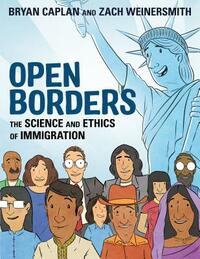Take a photo of a barcode or cover
informative
reflective
medium-paced
informative
inspiring
reflective
medium-paced
hopeful
informative
medium-paced
This should be required reading for all U.S. schools (instead it’s probably getting banned)
fast-paced
while i do love the case for open borders i found the strawmaning of socialism and islam troubling.
funny
hopeful
informative
fast-paced
Oof. I had high expectations of this one and while I still consider it a good enough read, I was somewhat disappointed. To be fair, most of Caplan's arguments seem sound (and I was still impressed by his broad knowledge and lines of thought), so what I'd like to point out are not fallacies but things I felt were either presented in a biased way or missing.
In short, here's where I saw the book's strong and weak points:
+ Very apt and accessible, statistics-based dismantling of populist claims opposing immigration ("Immigrants steal jobs", "immigrants are a fiscal burden", "cultural disintegration", "but terrorism", etc.) and their logical fallacies.
+ Analysis where those populist claims stem from (including their philosophical systems (e. g. libertarianism, utilitarianism, kantianism, etc.) with arguments why each of those should in fact favor open borders.
+ Showing how and why, aside from the purely moral incentives for open borders, immigration restrictions do no one a favor.
+ Examples for how immigration can be reframed in order to show the benefits outweigh the fears (including explanations of concepts like framing, the overton window, etc.)
+ Illustrative graphics, metaphors and comparisons to get the points across.
- Okay, I can see why explanations and pop science require some degree of simplification. Still it irked me how Caplan unabashedly writes about "rich"/"poor" and "developed"/"underdeveloped" countries with populations eager to emigrate to the West without mentioning that a large chunk of global-majority-countries' issues are linked to their exploitation and mistreatment by the same West he presents in such a favorable light. Sure, open borders and unrestricted immigration is the least these rich countries can do now, but there's a bigger dynamic that needs to be fixed here, and this was definitely missing in the book.
- Very capitalist-leaning. "The commies" are presented as the baddies in an almost laughably stereotypical way several times, and immigrants opposing a small(er) state is framed as a "potential threat" that needs to be dismantled.
- It's strongly US-centric. Caplan explicitly states as much, and while his main arguments in favor of open borders seem universal and still hold, the situation in other countries can be vastly different from what he describes, and the US-centric perspective spills over onto how certain concepts are used/defined (most notably that of "freedom", which in a US context includes things that would make other countries' toes curl)
- The chapter on "national IQ". The IQ itself is a controversial concept, the informative value of nation-states (in terms of culture etc.) is contested and so frankly, I'm somewhat surprised the "national IQ" is big enough of a thing for Caplan to have included it in the book. I see what he's trying to bring across in terms of brainpower that comes with immigration, and maybe it's just me, but that chapter was an unpleasant read.
- Yes, this is supposed to be first and foremost an economics book, and while individual well-being is adressed alongside the fiscal prosperity focus, I thought some important aspects to it such as discrimination, racism and inequality of immigrants vs. natives was largely left unadressed.
All in all still an informative read though, the book and its message are probably more important than ever in this day and age, and Weinersmith's illustrations are great!
In short, here's where I saw the book's strong and weak points:
+ Very apt and accessible, statistics-based dismantling of populist claims opposing immigration ("Immigrants steal jobs", "immigrants are a fiscal burden", "cultural disintegration", "but terrorism", etc.) and their logical fallacies.
+ Analysis where those populist claims stem from (including their philosophical systems (e. g. libertarianism, utilitarianism, kantianism, etc.) with arguments why each of those should in fact favor open borders.
+ Showing how and why, aside from the purely moral incentives for open borders, immigration restrictions do no one a favor.
+ Examples for how immigration can be reframed in order to show the benefits outweigh the fears (including explanations of concepts like framing, the overton window, etc.)
+ Illustrative graphics, metaphors and comparisons to get the points across.
- Okay, I can see why explanations and pop science require some degree of simplification. Still it irked me how Caplan unabashedly writes about "rich"/"poor" and "developed"/"underdeveloped" countries with populations eager to emigrate to the West without mentioning that a large chunk of global-majority-countries' issues are linked to their exploitation and mistreatment by the same West he presents in such a favorable light. Sure, open borders and unrestricted immigration is the least these rich countries can do now, but there's a bigger dynamic that needs to be fixed here, and this was definitely missing in the book.
- Very capitalist-leaning. "The commies" are presented as the baddies in an almost laughably stereotypical way several times, and immigrants opposing a small(er) state is framed as a "potential threat" that needs to be dismantled.
- It's strongly US-centric. Caplan explicitly states as much, and while his main arguments in favor of open borders seem universal and still hold, the situation in other countries can be vastly different from what he describes, and the US-centric perspective spills over onto how certain concepts are used/defined (most notably that of "freedom", which in a US context includes things that would make other countries' toes curl)
- The chapter on "national IQ". The IQ itself is a controversial concept, the informative value of nation-states (in terms of culture etc.) is contested and so frankly, I'm somewhat surprised the "national IQ" is big enough of a thing for Caplan to have included it in the book. I see what he's trying to bring across in terms of brainpower that comes with immigration, and maybe it's just me, but that chapter was an unpleasant read.
- Yes, this is supposed to be first and foremost an economics book, and while individual well-being is adressed alongside the fiscal prosperity focus, I thought some important aspects to it such as discrimination, racism and inequality of immigrants vs. natives was largely left unadressed.
All in all still an informative read though, the book and its message are probably more important than ever in this day and age, and Weinersmith's illustrations are great!
Read it. No matter where you stand on immigration I think you too will find this non-fiction graphic novel informative and compelling. It might not convince you, but it will definitely give you lots of information to process and what is education if not continuing to challenge your own preconceived notions.
I'll be chewing on some of this for a while and I am grateful it is in a format I can easily access again and again. Highly recommend.
I'll be chewing on some of this for a while and I am grateful it is in a format I can easily access again and again. Highly recommend.
I am not an economist, and I am aware that this book likely dramatically simplifies the situation, but the lack of open borders on this planet is something that has confused me forever. There are cogent arguments here.
4.5 stars. An important subject explained in a graphic format - occasionally confusing and difficult to understand topics are discussed in a manner not completely thorough, so I took off a .5 star.
This was on a feature shelf at my local library and I thought it might be good to read with my 9 year old. After a couple pages I realized it was too complicated for him.
This book moves pretty quickly and has a unique and thorough stance on immigration. I did have a hard time following this book from time to time, but immigration has never been an area I’ve focused my attention on so the concepts are foreign to me. The author seems a little idealistic, but overall I found value in reading this book.
This book moves pretty quickly and has a unique and thorough stance on immigration. I did have a hard time following this book from time to time, but immigration has never been an area I’ve focused my attention on so the concepts are foreign to me. The author seems a little idealistic, but overall I found value in reading this book.






